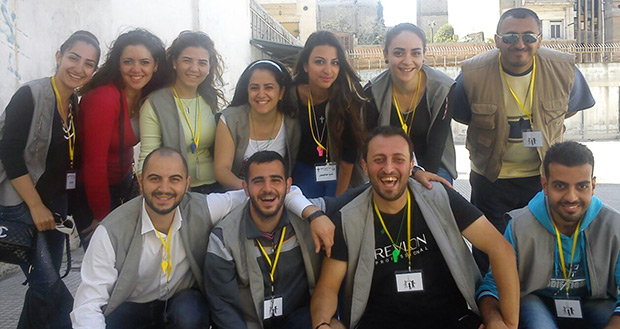
Written to adults in Children’s Church Ministries. [Editor’s note: This article is published here because it shows how adults can “be Jesus with skin on” – truly being “little Christs”, as the term “Christian” implies. The follower of Christ aims to mature daily …to be more and more like Christ. The pictures are of the Syrian group, some of whom gave their lives, living in danger – for Christ. The clown was serving Christ, “being Jesus with skin on” – when he was killed.]
I heard a story about a little boy who was crying in bed during a thunder storm. His mother came into the room to comfort him. In doing so, she reminded the little boy that “Jesus was with him always and he didn’t need to be afraid.” In responding, the boy looked up at his mother and said, “Yes Mom, I know that he is here, but this time I’d like to feel Jesus with skin on.”
You serve in Children’s Ministries because you believe that children need Jesus.
13 And they were bringing children to Him so that He might touch them; but the disciples rebuked them.
14 But when Jesus saw this, He was indignant and said to them,
“Permit the children to come to Me; do not hinder them; for the kingdom of God belongs to such as these. 15 Truly I say to you, whoever does not receive the kingdom of God like a child will not enter it at all.”
16 And He took them in His arms and began blessing them, laying His hands on them.
– Mark 10:verses 13-16
On the day recorded in Mark, the children were able to see Jesus’ loving face, feel His caring touch and hear His voice blessing them. They experienced Jesus with skin on. Today, Jesus still wants children to come to Him, but He is no longer in a physical body on earth through which children can experience Him. So how can they come to Jesus, receive His love and respond to His call?
..

Syrian Christian ministry team, Space for Hope
Child Development experts tell us that children are concrete thinkers. Until they reach approximately 12 years of age, they don’t reason logically like adults. They learn best through their senses of touch, hearing, seeing, tasting and smelling. So how do we help them know and love an invisible God?
God understood that we human beings face this challenge even as adults. How can we know, understand and love an invisible God?
And the Word became flesh, and [a: tabernacled; i.e. lived temporarily]dwelt among us, and we saw His glory, glory as of [b: unique, only one of His kind]the only begotten from the Father, full of grace and truth.. – John 1:14
1 What was from the beginning, what we have heard, what we have seen with our eyes, what we have looked at and touched with our hands, concerning the Word of Life— 2 and the life was manifested, and we have seen and testify and proclaim to you the eternal life…. – I John 1: verses 1-2a
God sent Jesus to live as a man among us. People saw him, touched him, heard him, and ate with him! And these experiences were recorded for our benefit so that we can know who God is and how He acts and interacts with us.
…we have seen and testify and proclaim to you the eternal life, which was with the Father and was manifested to us— 3 what we have seen and heard we proclaim to you also, so that you too may have fellowship with us; and indeed our fellowship is with the Father, and with His Son Jesus Christ. – I John 1: verses 2b-3

Since young children have a hard time relating to someone they cannot see physically, we have the opportunity to make God “visible” for them in our words and actions. We can put “skin on Jesus” for them. You want children to know that God loves them? Show them His love. You want children to know that God forgives them? Forgive them when they sin against you. You want children to know that God always does what is best for them? Live selflessly before them, seeing that you put their interests before your own.
Parents and children’s ministry leaders provide a human example of God. Paul taught this in his epistles.
Brethren, join in following my example, and observe those who walk according to the pattern you have in us. – Philippians 3:17
Be imitators of me, just as I also am of Christ. – I Corinthians 11:1
As a teacher of children, you are providing them a visible example for them as you follow the invisible Christ..
 Listen
Listen
God invites us into conversation with Him. Yes, He speaks to us through the Bible and through His Spirit. But He also invites us to speak to Him.
Be anxious for nothing, but in everything by prayer and supplication with thanksgiving let your requests be made known to God. – Philippians 4:6
6 Therefore humble yourselves under the mighty hand of God, that He may exalt you at the proper time, 7 casting all your anxiety on Him, because He cares for you. – 1 Peter 5: verses 6-7
Sometimes you will teach more through listening than through speaking. So often we teachers come to class, full of information that we want to share, thinking this is the best way of teaching. It’s as if we’ve filled a big truck full of facts that we want to back up and dump out on the class.
However, when you listen, you show the other person that you care. You set aside whatever else you might be doing in order to listen to their thoughts or questions. The truth is that children won’t remember lessons or information that you speak, but they will remember YOU and the times that you listened to them.
…
You model a caring God when you listen to your students. Do you know what is going on in their lives? Is their father unemployed? Is their mother having a new baby? Is the child being bullied at school? You find out these concerns by listening.
Love
We have come to know and have believed the love which God has for us. God is love, and the one who abides in love abides in God, and God abides in him. – I John 4:16
How can you teach about God’s love? You teach God’s love through being loving. According to 1 Corinthians 13 all of our efforts are in vain—including creative teaching ideas and tremendous teacher preparation—if we do not love. As you prepare your lesson, always ask God to speak through you and to love through you. You want to touch hearts for eternity, not minds for an hour.
…
My 4th Grade Sunday School teacher was Miss Schipper. I was a shy, quiet child, but Miss Schipper worked hard at drawing me out, giving me confidence to ask and answer questions. We had fun in her class. She invited us to her apartment for lunch. Truthfully, I don’t remember a single lesson that she taught, but I do remember her. I knew she loved me. Do you think it’s a coincidence that I continue in ministry to children almost 50 years later?
…
Pray
You have limits on your time and energy. You don’t always know the best way to reach kids’ hearts or solve their problems. But you know someone who does…God. So one of the best ways to minister to children is to pray for them.
Take photos of them so that you can look at their faces and pray for them individually. Keep a prayer log and record your requests, then record the answers. Follow up on the prayer requests, asking the children how their grandmother is after they ask you to pray for her. Pray for wisdom to draw out the shy child, to discipline the disruptive child, to comfort the sad child and to calm the nervous child .
But if any of you lacks wisdom, let him ask of God, who gives to all generously and without reproach, and it will be given to him. – James 1:5
Safety
Many times the Psalms refer to God as a “refuge” and a “fortress.” We trust that God will take care of us. Make your class a safe place, too, a refuge from the insults and hurts of the world. Ensure that kids know that your class is a “putdown-free place.” Don’t put children in competition with each other for your attention. Let them know that each person is loved and their ideas are valued.
…
Here’s an idea to create a safe class: use a “put-up chart” to deal with put-downs. If a child puts down another child, they are given sticky notes to put up that build up and affirm that child instead. “Sammy has a nice smile.” “Sammy is a good friend.”
…
The teacher of a safe class will appreciate all children’s strengths and spiritual growth. Some children find it easy to memorize a Bible verse and rattle it off quickly for a piece of candy or other award. Other children will struggle to memorize, causing them to feel like failures in Sunday School.
Evaluate your program. Are you reinforcing only kids who are able to sit quietly and recite verses? How can you affirm the active child who wants to move around or has a hard time memorizing words? When a child helps another child look up a verse in the Bible, thank him or her for kindness. When a child says, “Please” or “thank you,” affirm them for showing respect. When a child invites a new child to join in a game, once again take time to thank him or her. There are so many different ways that children can be affirmed for spiritual growth beside rote memorization or perfect attendance.
…
Another way to create a safe class is to make sure that child protection policies are in place.
but whoever causes one of these little ones who believe in Me to stumble, it [a]would be better for him to have a [b]heavy millstone hung around his neck, and to be drowned in the depth of the sea. – Matthew 18:6
Screen all children’s workers with interviews, background checks and references to make sure that they can be trusted with precious children. Ensure that no adult or teen is ever alone with a child.
…
Sometimes I will be alone in a classroom early Sunday morning when a parent brings one child. I will explain the policy and ask that he or she wait with their child until another child or worker arrives. It gives me time to talk with the parent and child, helping me to understand what is going on in their lives as well as keeping both me and the child safe from any alleged mistreatment.
…
Apply God’s Word
God doesn’t want us to simply know facts from the Bible. He wants us to live out the Bible in our lives and in our relationships with others.
But prove yourselves doers of the word, and not merely hearers who delude themselves.
– James 1:22
As you read the Scripture for the lesson you will teach, ask God to show you how it applies to your life. You will be able to share age-appropriate examples from your life with your class, showing them that you are learning along with them.
Also, show the class how it applies to their lives. For example, as you teach about creation from Genesis, share with your class what you are most thankful for in God’s creation. Encourage them to think of different creatures and to thank God for them, as well. Challenge them to look for God’s creations that week and be thanking God for them. Then give them time to share what they observed next Sunday.
God bless you as you listen, love, pray, create safety, and apply God’s Word, for you will be helping to “put skin on” Jesus for them.
…
Does this (9 anywhere?
my reply…